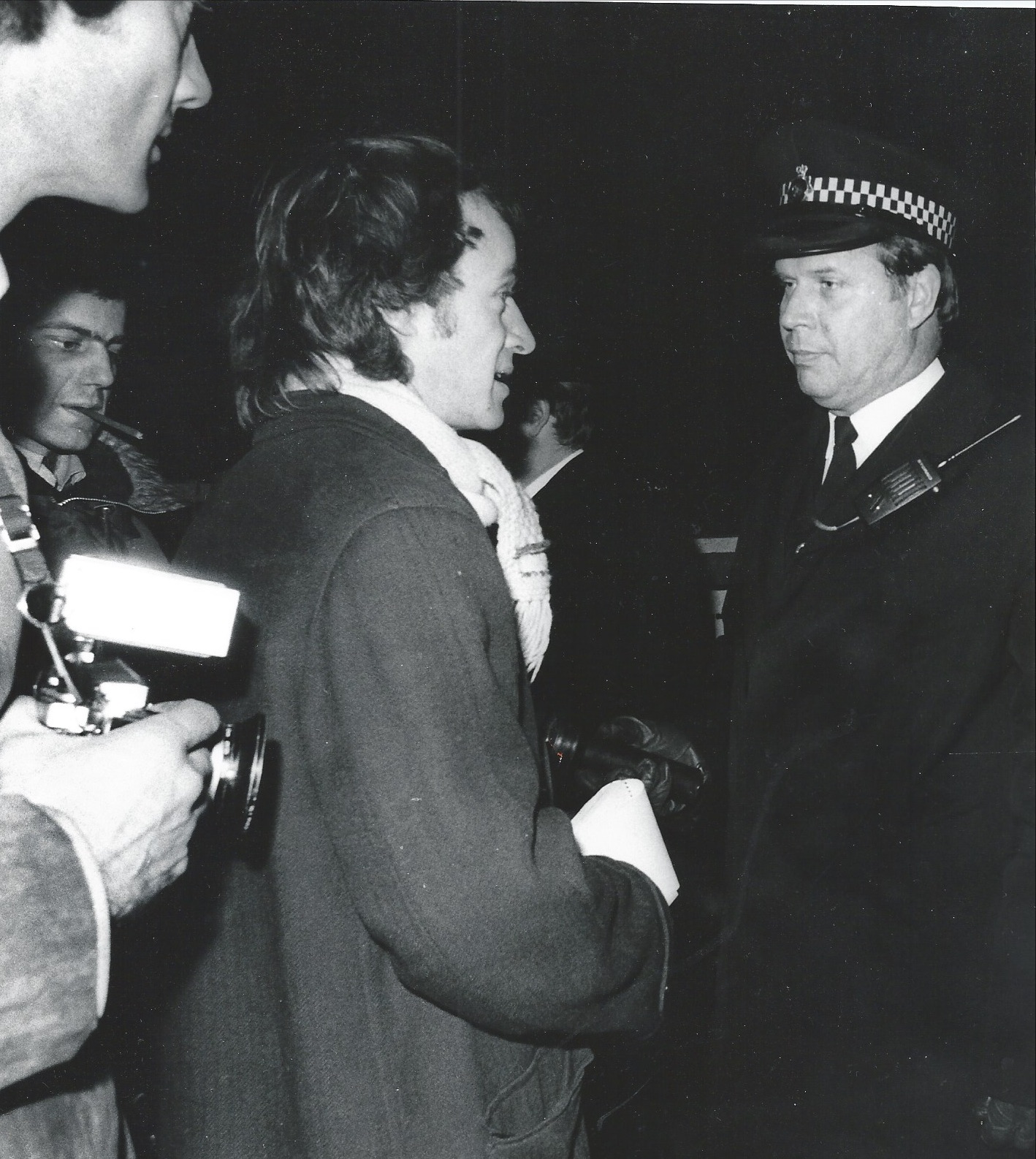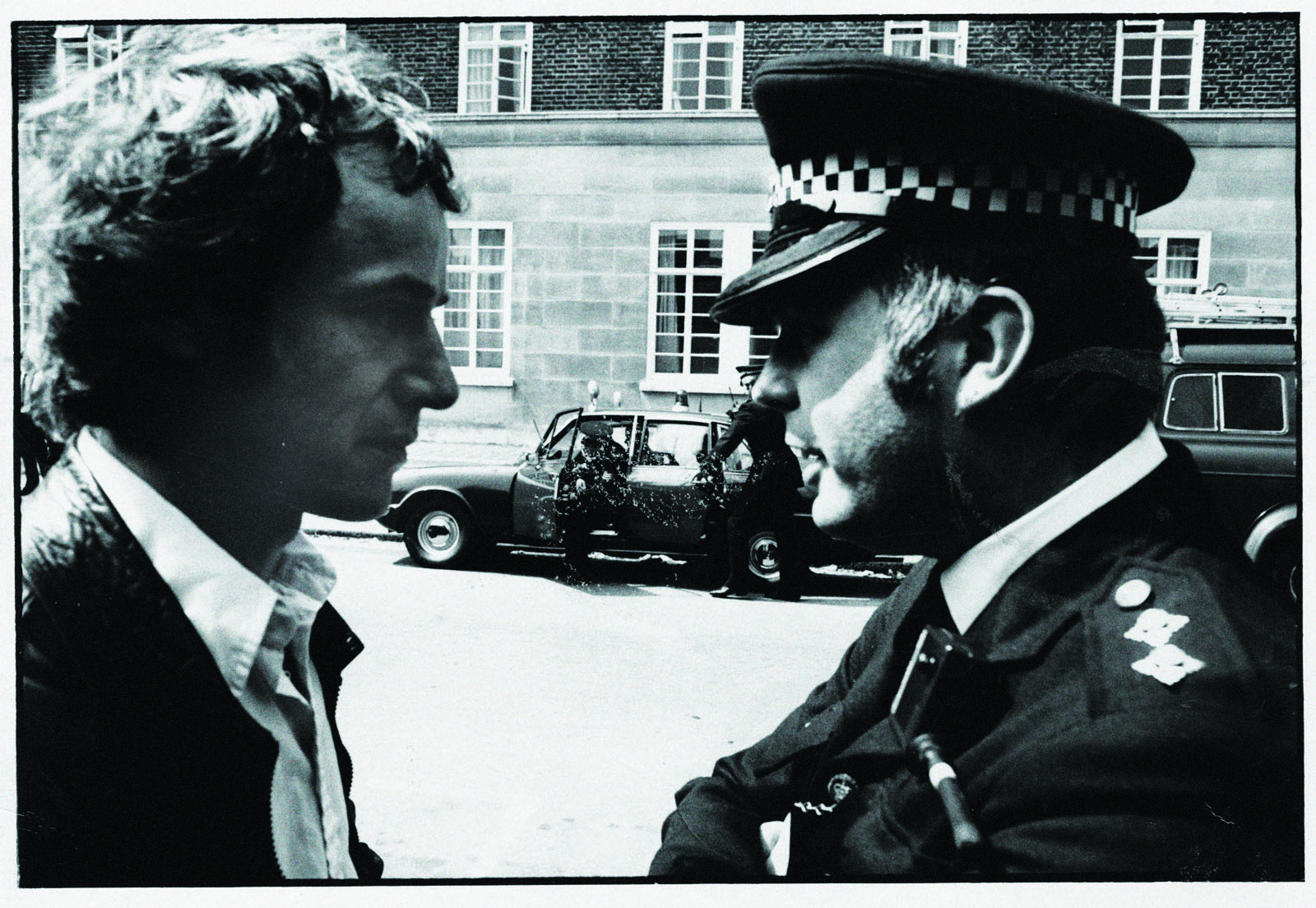The veteran journalist Duncan Campbell has written the definitive history of crime reporting shining a light on the poisoned relationship between hacks and coppers. He tells Jon Robins how the hacking scandal changed everything
‘It is impossible to have an off-the-record conversation with a detective these days,’ reflects Duncan Campbell, the Guardian’s former crime correspondent. ‘The police are so frightened of being accused of selling stuff to the papers.’ His new book, We’ll all be murdered in our beds!, is a paean (of sorts) to a lost age of crime reporting that the journalist lived and worked through – he left the Guardian in 2009.
The history falls into two halves AL and BL: after and before Leveson. The relationship between hacks and coppers, lubricated by booze and often secured through backhanders, came to an abrupt end with the hacking scandal.
A nostalgia pervades his book. ‘It was a world of booze and tobacco and camaraderie and cheerfully creative expenses,’ Campbell writes at one point. We meet in a pub around the corner from the Hatton Garden safe-deposit company. The book ends in January this year in Woolwich Crown Court at the trial of the men accused of breaking into its vaults and making off with £14m worth of jewelry, gold and cash.
It was an old school robbery in more ways than one: an audacious heist – the gang climbed down a lift shaft to use diamond tipped industrial drills to drill through the walls – executed by villains of pensionable age.
Campbell, who is 71 years old, wryly notes that the so-called ‘Diamond Wheezers’, for all their ingenuity, are foiled by their failure to get to grips with mobile phone technology. Apparently, it had not occurred to them that the police might be listening in. ‘It is as if they are trapped in a sort of criminal aspic,’ Campbell wrote.
‘It is rather sad that detectives think they cannot talk and meet like we are meeting now in a pub and have a chat about Arsenal or who Basil might be in the Hatton garden burglary,’ the journalist says.
Back in the day, crime reporters and the police would spend the night drinking themselves under the table and then, as Campbell puts it, the journalist would drive the detective to the scene of the crime. Times change. The pub we meet in styles itself as a ‘Craft Ale Co’ and we’re drinking overpriced mineral water.
A prism through which we see society
The book charts our obsession with crime from the days of Hogarth and taking in pioneers such as William Thomas Stead, who campaigned to highlight the scandal child prostitution in 1855, and Duncan Webb described by Time magazine in 1955 as ‘the greatest crime reporter of our time’.
Crime, Campbell argues in his book, acts as a ‘prism through which we see society and its anxieties and phobias’. ‘A day in a magistrates’ court provides as illuminating a snapshot as any lengthy think-tank report or ministerial briefing on the state of education, immigration, unemployment, drug use, alcoholism, mental health and popular culture, not to mention policing, the criminal justice system and the failures or successes of government policies.’
That might be true but, outside of the Old Bailey or the Royal Courts of Justice, you are ‘as likely to see a zebra as a reporter’, as his former Guardian colleague Nick Davies put it in his 2009 book Flat Earth News.
‘In the old days every local paper covered court cases religiously. Along with funerals, and the local football team, courts were their bread-and-butter,’ Campbell says. ‘That has more or less died. It takes up too much time. You are better off sitting in your office seeing what someone has tweeted about. There is no culture of covering court cases anymore.’
Campbell notes disapprovingly that coverage of a recent murder in the West Country drew on other people’s tweets. ‘If I was up against a deadline, then it is easier than getting down there or phoning up a relative,’ Campbell says. ‘It is terribly tempting.’ But, as the journalist points out, the information is unchecked and those on twitter most likely to proffer a view ‘tend to be the most narcissistic people around’. ‘I know that’s that sounds like I’m an old fart,’ he adds.
Our fascination with celebrity has replaced our old obsession with crime, Campbell argues. ‘That is why when the Hatton Gardens happened everyone loved it. It reminded all the old farts of what fun it was,’ he says.

Duncan Campbell, around 1980
‘Fuck me, it’s the prince of darkness’
His book is filled with ‘larger than life’ characters such as Jimmy Nicholson, one of the biggest names of the postwar crime correspondents. He once claimed to have covered ‘every siege since Troy’ and known by journalists and judges alike as the ‘Prince of Darkness’. Nicholson died this year and veteran crime reporters met at the Magpie & Stump by the Old Bailey for his send off. The reporter asked for his ashes to be scattered in every pub in Fleet Street.
Campbell ascribes no less than three possible stories as to how the reporter came by his demonic nickname. On the Nicholson’s own account, it dated back to when he was first given his trademark black cape (reporting on covens in the Isle of Man apparently). Alternatively, it could have derived from a senior police officer who, at an IRA siege in London in 1975, is alleged to have remarked ‘That devil Nicholson is here’; or else from a colleague who, at the so-called Spaghetti House siege where black militants held restaurant staff hostage for six days, looked up to see Nicholson holding his cape as if to take flight fly from a hotel balcony and declared: ‘Fuck me, it’s the prince of darkness.’
Nicholson was known as a ‘buy up’ merchant persuading people to tell their story on the promise of a cheque. ‘I used to lie, I’m afraid,’ Nicholson told Campbell.
Occasionally, those acquitted of a major crime would sell their stories too. For example, after the boxer Terry Marsh was cleared of attempted murder of promoter Frank Warren in 1990, journalists queued up at a Greek restaurant in East London.
‘We all stood outside and waited,’ Campbell tells me. ‘You’d go in and make your bid for the story. I explained I was with the Guardian and we would make a donation to a charity of his choice. He laughed.’ In the end, The Sun/News of the World sealed the deal with a joint bid of £140,000.
There are no end of ‘Life on Mars’ style anecdotes in the book. For example, the police officers in the 1970s who would persuade suspects that their new fangled photocopier was, in fact, a lie detector. The gullible suspect would be asked to put his hand under the flap and answer questions as the light flashed. ‘They got clear up after clear up through that,’ one veteran reporter noted.
Embedded
But for all the nostalgia, Campbell is admirably clear that the good old days were, in fact, rotten to the core. A theme of the book is the corrosive co-dependency between the police, corruption is a fairly persistent but unreported feature, and a press only to happy to overlook those shortcomings in their pursuit of sensationalist copy.
The complicity between hacks and coppers – the ‘overly cosy relationship’, as Sir Brian Leveson put it – did absolutely nothing to shine a light on what was going on in many parts of the police in the 1970s and 1980s.
That’s because crime reporters’ clique was firmly embedded in the police camp. ‘We were always cheerleaders for the CID because they were the people who would give us stories,’ John Twomey, the crime correspondent of the Daily Express, tells Campbell. We learn that in the 1970s the Evening Standard’s crime correspondent, John Sullivan used to meet his police contacts every week in a hotel bar in the West End where he would dole out the envelopes for stories supplied.
Corruption was ‘endemic’ in the 1960s/70s, notes Campbell. ‘Paul Condon, commissioner for the Metropolitan Police in the 1990s, told me once that he had stayed in uniform because it was so difficult to be a detective and not be compromised,’ says Campbell. ‘As a new officer on your first job, somebody would stick some money in your pocket and that was it. You were in.’
Campbell used to know a number of North London bankrobbers. ‘There used to be one bank robbery a week. Now there’s one every two months,’ he says. ‘They used to tell me it was a relief when the police came to their door. They’d pay £2,000 and that was the end of it.’
It was a different breed of journalists – the likes of Chris Mullin, who campaigned against the conviction for the Birmingham Six, and Paul Foot at Private Eye – who exposed the rot. Mullin became an MP in 1987. ‘Loony MP backs bomb gang,’ said the Sun the day after Birmingham Six’s first appeal was dismissed in 1988.
Duncan Campbell had his own battles with the Police Federation in the early 1990s when he reported on a corruption investigation in Stoke Newington police station. Eight officers were transferred to different stations but, he makes clear, the Guardian did not name them or suggest they were in any way involved.
At that point, anyone wanting to sue for libel could do so within three years of the article. Campbell relates how ‘some two years and 300-odd days later’, the writs hit the paper. The then editor, Alan Rusbridger took on the police and won. The officers appealed and again lost costing the Police Federation £600,000.
Campbell doesn’t make too much of this episode in his book. This is from Rusbridger’s editorial: ‘Our victory today was all thanks to the perspicacity and common sense of the jury and no thanks to the court, the judge or the law. We risked hundreds of thousands on the verdict of the jury today. How many smaller papers will take that risk?’ In less than three years before the Federation’s lawyers Russell Jones & Walker (Slater & Gordon) fought and won 95 defamation actions winning £1,567,000 for their members. ‘Nice little earner for the coppers,’ the Guardian’s editor noted. ‘
It was his old paper’s work on exposing the hacking scandal that led to Lord Justice Leveson’s inquiry that everything. ‘I blame News International more than the police, more than Leveson,’ says Campbell. ‘Too many journalists were charged – the small fry – and the big fish got way.’
‘The top level of News UK ratted on their journalists and gave all their sources to the police. They handed over millions of emails,’ the journalist continues. In his book, he quotes his old paper’s present correspondent, Vikram Dodd on the post-Leveson relationship with the police. ‘Every time I pick up the phone, I am potentially putting them in a position of a disciplinary offence,’ Dodd says.
The journalist is a former chair of the Crime Reporters Association. He points out that they were forced to cancel their Christmas party last year ‘because no detectives would come’.
We’ll all be murdered in our beds: The shocking history of crime reporting in Britain Duncan Campbell – out now








